
Understanding Developmental Delays and the Role of Support Systems
Developmental delays are a broad phenotypic phenomenon characterized by children not achieving expected milestones across various domains such as motor skills, speech, cognition, and social interaction. Recognizing and addressing these delays early can significantly alter their developmental trajectory. This article explores the causes, identification, and intervention strategies available, emphasizing the critical role of support systems like the Division of Developmental Disabilities (DDD) and early intervention programs.
What Are Developmental Delays and How Are They Identified?
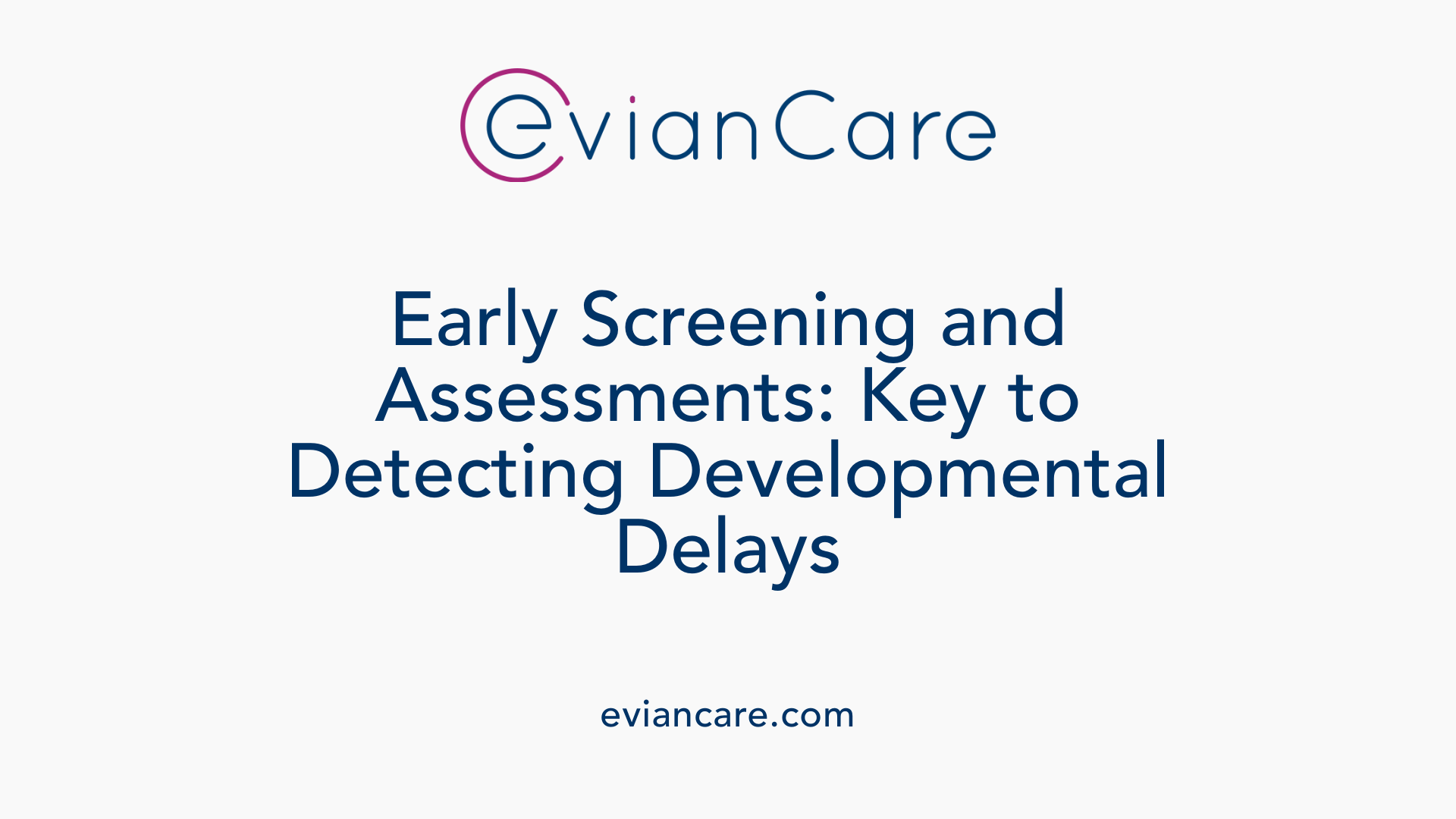
What are developmental delays and how are they identified in children?
Developmental delays happen when a child is slower to develop skills in areas such as movement, language, social interaction, or thinking compared to their peers. These delays are signals that a child's growth in these areas is not keeping pace with typical milestones.
Healthcare providers use various screening tools during regular check-ups to spot possible delays early. Common assessment methods include questionnaires like the Ages and Stages Questionnaire (ASQ-3) and the Modified Checklist for Autism in Toddlers (M-CHAT), along with observational evaluations.
When screening indicates potential delays, professionals conduct detailed assessments to understand the child's strengths and challenges. These evaluations may involve specialists such as pediatric neurologists, speech therapists, or occupational therapists.
Several factors can increase the risk of developmental delays. For example, prematurity, family history of delays, exposure to environmental toxins, or complications during pregnancy or birth can all contribute.
Early detection through these screenings and assessments is critical. Recognizing delays as soon as possible allows for timely intervention, which can include therapies, educational support, and other services aimed at helping children reach their full potential.
By actively monitoring developmental progress and addressing concerns early, parents and healthcare providers can significantly improve long-term outcomes for children with delays.
The Causes of Developmental Disabilities and Delays
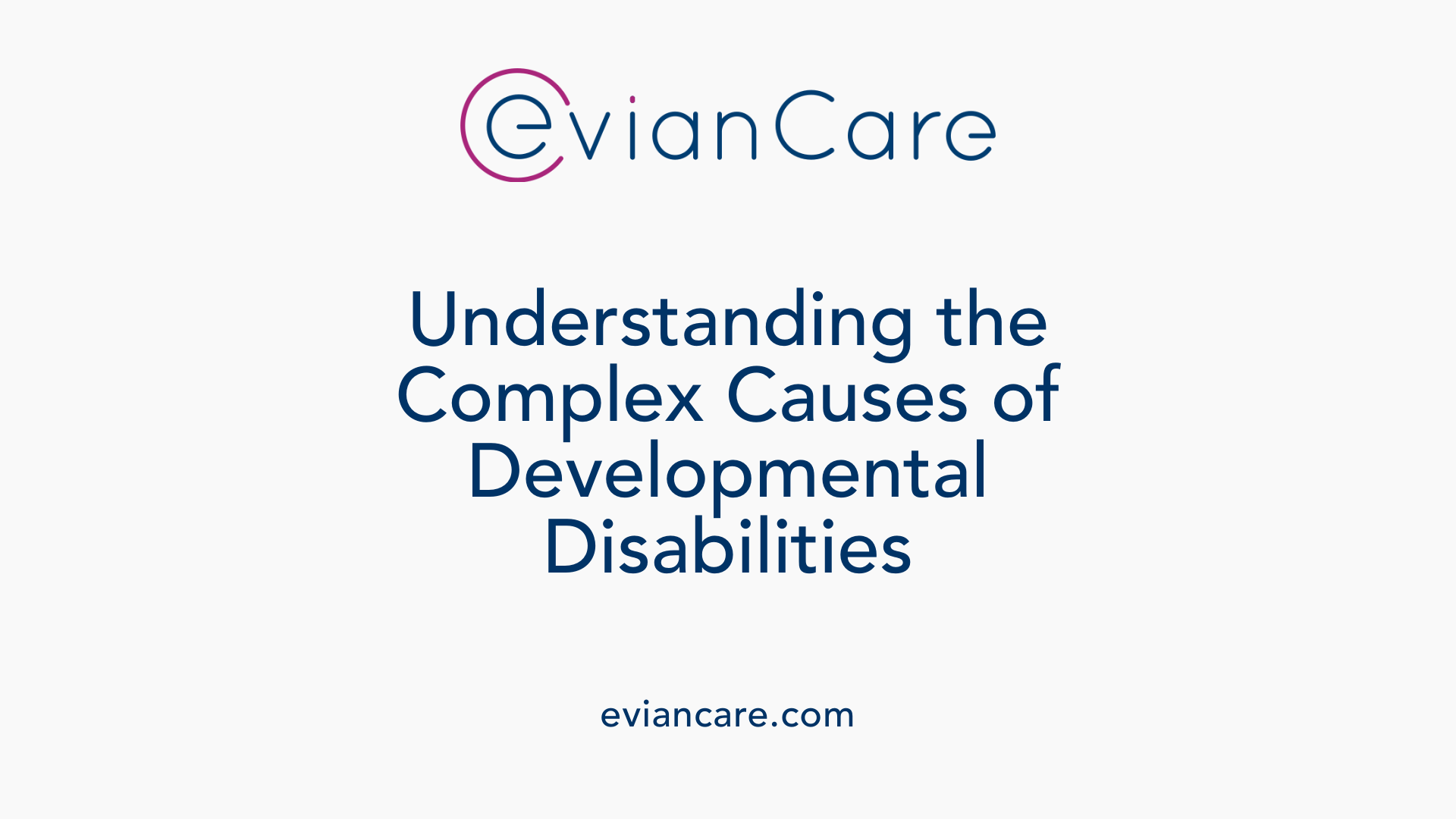
What are the causes of developmental delays?
Developmental disabilities result from a variety of factors, often interacting in complex ways. Genetic abnormalities like Down syndrome and fragile X syndrome are common genetic causes, which can affect physical growth, learning, speech, and behavior.
Environmental influences also play a significant role. For example, infections during pregnancy such as rubella or cytomegalovirus can interfere with fetal development. Exposure to environmental toxins, like lead or certain chemicals, can adversely affect developing brains.
Perinatal complications also contribute to developmental delays. Issues such as fetal distress, oxygen deprivation during birth, or premature delivery can impact neurological outcomes. Additionally, untreated neonatal conditions like jaundice can lead to kernicterus, further impairing development.
Children with a sibling diagnosed with autism spectrum disorder (ASD) are at a higher risk of also developing ASD, indicating a genetic component. It is important to recognize that most cases involve a mix of genetic, environmental, and psychosocial factors. Early diagnosis and intervention can make a substantial difference in outcomes for affected children.
Overall, understanding these diverse causes emphasizes the importance of early detection and a comprehensive approach to preventing and managing developmental disabilities.
Strategies and Therapies to Support Developmental Milestones
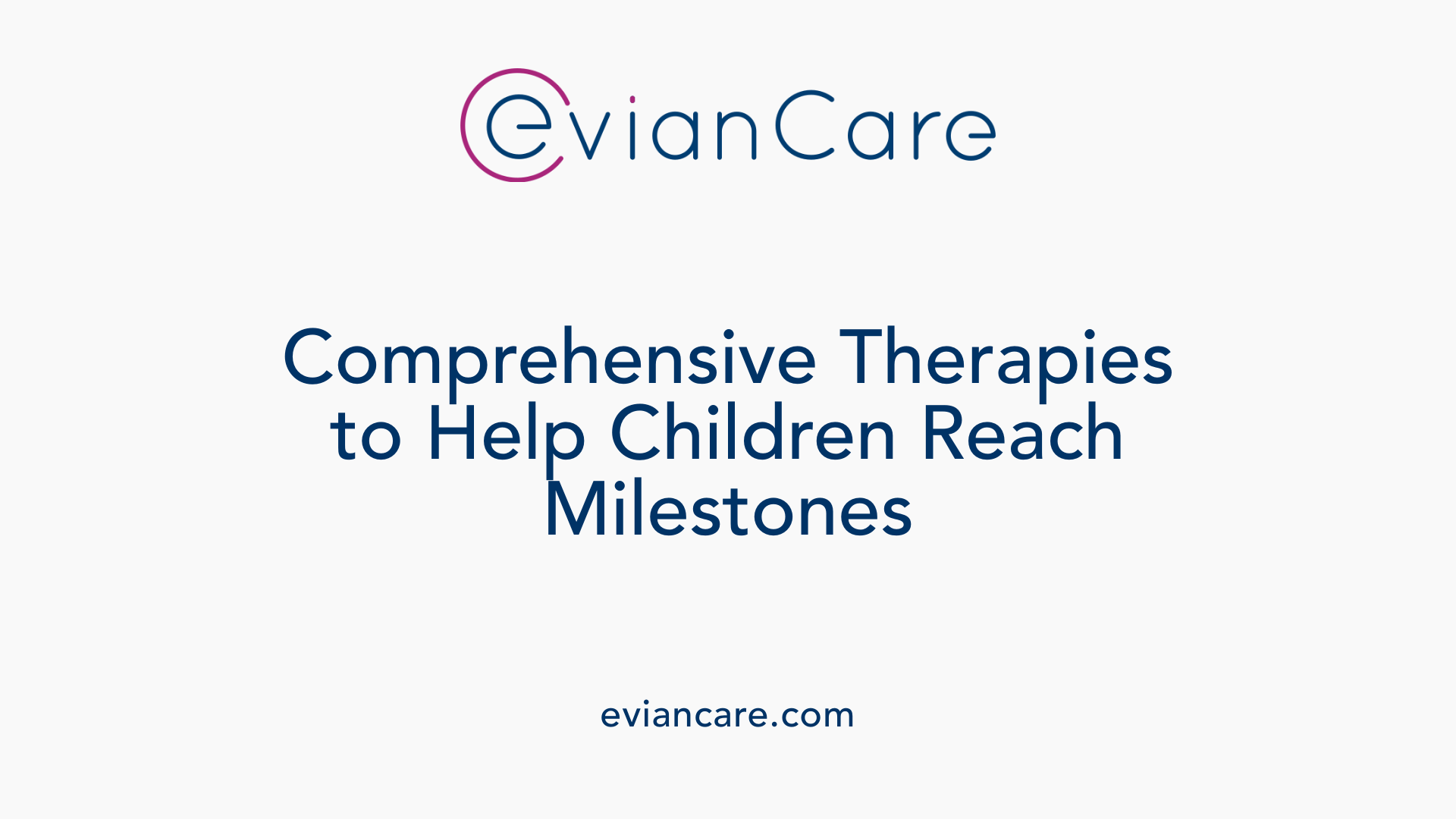 Supporting children with developmental delays requires a coordinated, multidisciplinary approach involving various therapies tailored to each child's needs. Physical therapy plays a crucial role in enhancing gross motor skills such as sitting, crawling, and walking. By engaging children in specific activities and exercises, physiotherapists help improve muscle strength, balance, and coordination, which are essential for achieving milestone skills.
Supporting children with developmental delays requires a coordinated, multidisciplinary approach involving various therapies tailored to each child's needs. Physical therapy plays a crucial role in enhancing gross motor skills such as sitting, crawling, and walking. By engaging children in specific activities and exercises, physiotherapists help improve muscle strength, balance, and coordination, which are essential for achieving milestone skills.
Occupational therapy focuses on developing fine motor skills and sensory processing abilities. Therapists work on activities like grasping, dressing, and feeding while also addressing sensory sensitivities that may affect learning and social participation.
Speech and language therapy are vital for improving communication skills. These therapists help children develop speech, understanding, and social interaction abilities through targeted exercises, visual cues, and innovative techniques.
Early intervention services are fundamental in supporting developmental progress. These services often include various supports such as audiology, assistive technology, and behavioral interventions, which assist children in reaching their best potential. For example, applied behavior analysis (ABA) is an evidence-based behavioral therapy designed to promote positive behaviors and reduce challenges, especially useful for children with autism spectrum disorder.
Most developmental delays can improve over time with appropriate therapies and family support. Consistent involvement, early action, and personalized treatment plans significantly influence positive outcomes. Collaboration among healthcare providers, educators, and families ensures that interventions are effective and tailored.
In summary, early, comprehensive therapy programs, combined with family engagement, are essential strategies to help children surpass developmental hurdles, achieve milestones, and enhance their quality of life.
Importance of Early Intervention and Its Impact
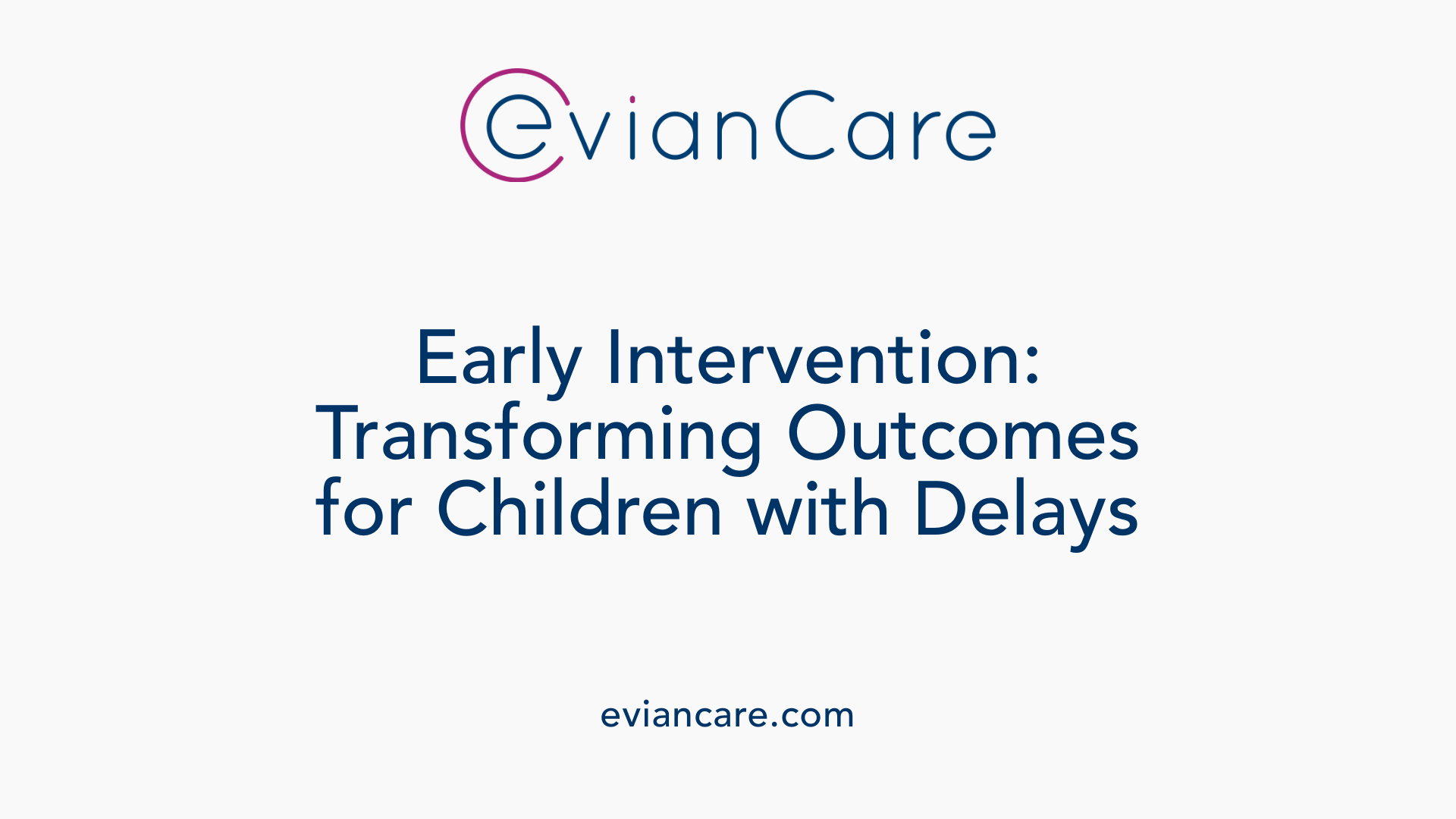
How important is early intervention for children with developmental delays?
Early intervention plays a crucial role in supporting children with developmental delays. During the first three years of life, the brain exhibits high plasticity, meaning it is especially adaptable and capable of forming new connections. Intervening early allows children to develop critical skills across multiple areas such as communication, social interaction, learning, and motor abilities.
Timely detection through developmental screenings and assessments enables access to therapies and supportive services promptly. These include speech therapy, occupational therapy, physical therapy, and family education, which can significantly improve a child's developmental trajectory.
Early intervention not only helps children attain important milestones like walking, talking, and self-care skills but also fosters independence and confidence. Additionally, it can positively influence long-term educational success and social adaptation.
Supporting families with resources and guidance reduces stress and encourages active participation in their child's development. Overall, the sooner intervention begins, the better the outcomes, as it maximizes the child's potential and can significantly alter their future development for the better.
How does brain plasticity in early childhood influence developmental support?
Brain plasticity refers to the brain's ability to change and adapt in response to experiences and learning. In young children, this capacity is at its peak, making early intervention highly effective. Interventions during this window promote neural development, strengthen connections, and can even compensate for early deficits.
What are the benefits of timing for intervention?
Interventions initiated early often result in greater gains because they leverage brain flexibility. Delayed support can lead to missed opportunities for optimal development, making later interventions less effective.
How does family support and education contribute?
Empowering families with knowledge and skills through education enhances the child's progress. Active family involvement in activities like play and routines, coupled with professional guidance, creates a nurturing environment conducive to development. It also builds parental resilience and confidence.
| Aspect | Importance | Impact |
|---|---|---|
| Brain Plasticity | High in early childhood, ready for support | Promotes neural growth, improves developmental outcomes |
| Timing of Intervention | Critical in first 3 years | Maximizes skill acquisition and independence |
| Family Support & Education | Essential for sustained growth | Leads to better engagement and long-term success |
Supporting early intervention ensures children with developmental delays have the best chance to thrive. It is a collaborative effort that benefits not just the child but the entire family.
Resources and Support Programs for Children with Delays
What resources and programs are available to support children with developmental delays?
Supporting children with developmental delays involves a variety of programs and services tailored to different ages and needs. Early intervention services are designed for children under 3 years old. These services include comprehensive assessments, therapies such as speech, occupational, and physical therapy, and medical support, usually provided at no cost or on a sliding fee scale.
For children over age 3, public education systems play a vital role. Under the Individuals with Disabilities Education Act (IDEA), eligible children can access free special education and related services through local school districts. These services help children develop skills necessary for independence and success in school.
State agencies like the Office for People With Developmental Disabilities (OPWDD) and regional systems such as Child Find are essential resources. Child Find actively promotes and provides free developmental screenings and evaluations, ensuring that children with potential delays are identified early. OPWDD offers supports to help individuals with developmental delays live independently, engage in community activities, and access employment and housing opportunities.
Support for families is also available through parent resource centers, community organizations, and local agencies. These entities offer training, guidance, and advocacy services, empowering families to navigate and utilize available resources effectively.
Resources overview table
| Program/Resource | Age Range | Services Provided | Additional Details |
|---|---|---|---|
| Early Intervention Services | Under 3 years | Assessments, therapies, medical support | Usually free or sliding scale |
| Public School Special Education | 3 years and older | Educational programs, related services | Free with eligibility |
| Child Find System | All ages | Developmental screenings, evaluations | Free, statewide coverage |
| Support from OPWDD | All ages | Independent living support, community activities | Focused on adults and transition age |
| Parent Centers and Community Organizations | All ages | Training, advocacy, family support | Local resources to assist families |
How can parents find additional help?
Parents and caregivers can search for support programs and services by looking up local early intervention agencies, contacting their school district’s special education department, or visiting official state health and education websites. Keywords like “Support programs and services for children with developmental delays” can lead to comprehensive resources and contact information.
Early recognition and utilization of these resources are critical to helping children reach their full potential and improve their developmental trajectories.
Supporting Children with Conditions like Down Syndrome
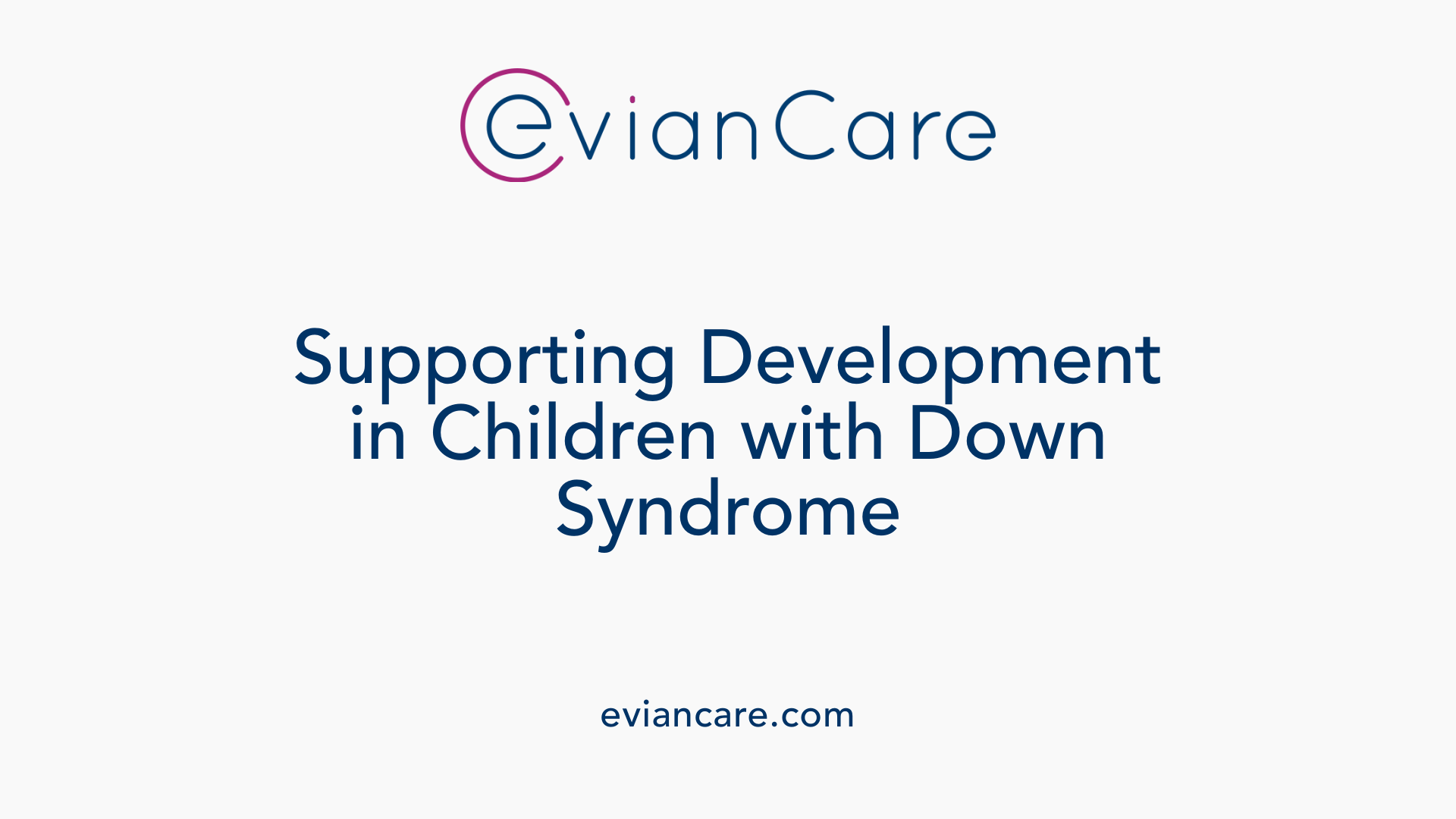
What are typical developmental trajectories for children with Down syndrome?
Children with Down syndrome usually follow a developmental path similar to their peers but with noticeable delays in reaching milestones. They tend to take longer to sit independently, stand, and walk due to challenges like low muscle tone and poor balance. While most develop essential skills for daily living and independence, these skills often occur later than in children without Down syndrome.
Developmentally, children with Down syndrome might experience delays in motor, language, and cognitive skills, but with early and ongoing support, many can reach a high level of functioning. Monitoring these developmental milestones helps ensure timely intervention and support.
What physical and cognitive challenges are faced?
Many children with Down syndrome encounter physical challenges such as poor balance, decreased muscle strength—often 40-50% less than their peers—and ligament laxity. These factors can influence their motor development and coordination.
Cognitively, children may experience delays in learning, speech, and self-help skills. They are at higher risk for health issues like obesity, which can further impact mobility and overall health.
Despite these difficulties, children with Down syndrome can engage in a variety of activities and enjoy meaningful social interactions when provided with appropriate support.
How does early support and intervention help?
Early interventions, including physiotherapy, speech therapy, and occupational therapy, are crucial in promoting optimal development. Physiotherapy specifically supports muscle strength, coordination, and balance, helping children achieve milestones like sitting, crawling, and walking.
Speech therapy assists in developing communication skills, including language, turn-taking, and early sounds—building a foundation for expressive and receptive language.
Occupational therapy helps children develop independence in daily activities such as feeding, dressing, and fine motor skills.
By tailoring these interventions to each child's needs, support programs aim to maximize abilities, reduce delays, and improve overall quality of life. Starting early is essential to leverage brain plasticity and promote better outcomes.
How can support strategies be tailored for children with conditions like Down syndrome?
Children with Down syndrome generally reach essential motor skills necessary for daily life, but often at a later age and with less refinement. Support strategies focus on early physiotherapy to address poor balance, low muscle tone, and coordination issues, aimed at strengthening muscles and promoting normal motor development.
Speech and language therapies focus on developing communication skills, supporting oral motor development, and encouraging social interactions. Occupational therapy concentrates on daily living skills, fostering independence in activities like feeding and dressing.
These individualized interventions help build on each child's strengths, address specific challenges, and promote overall development. Consistent support not only improves physical and cognitive outcomes but also enhances confidence and social participation.
| Developmental Area | Typical Timeline for Children with Down Syndrome | Support Strategies | Expected Outcomes |
|---|---|---|---|
| Sitting Independently | Usually later than 6 months | Physiotherapy, balance exercises | Achieving milestones, improved stability |
| Walking | Often delayed to 2-4 years | Gait training, muscle strengthening | Better mobility and independence |
| Speech Development | Significant delays | Speech therapy, early language programs | Enhanced communication skills |
| Self-care Skills | Gradual development | Occupational therapy, behavioral support | Increased independence and confidence |
Supporting children with Down syndrome involves a comprehensive approach that respects their individual pace of development. Early, targeted therapies and consistent encouragement help children reach their full potential and enjoy active, fulfilling lives.
Role of Physiotherapy and Clinical Approaches in Managing Delays
What role does physiotherapy play in managing developmental delays?
Physiotherapy is a vital intervention for children with developmental delays. Its primary goal is to enhance a child's independence by promoting motor skills necessary for daily living. Through tailored exercises and activities, physiotherapy addresses specific challenges such as low muscle tone, poor balance, and coordination issues.
Early physiotherapy can help children reach important physical milestones like sitting, crawling, and standing more efficiently. By focusing on muscle strength, posture, and movement control, it helps prevent or lessen the severity of delays. Because of its effectiveness, physiotherapy is a core component of a multidisciplinary support system, especially for children with conditions like Down syndrome, who often experience ligament laxity and muscle weakness.
Physical milestones supported by physiotherapy
Physiotherapy targets fundamental developmental milestones, including:
| Age (Months) | Expected Milestones | How Physiotherapy Helps |
|---|---|---|
| 6 | Head control, rolling over | Exercises to strengthen neck and trunk muscles |
| 12 | Sitting without support | Activities to improve balance and core strength |
| 18 | Crawling, standing | Play-based tasks encouraging crawling and weight-bearing |
| 24 | Walking, climbing stairs | Supportive activities to build gait, balance, and coordination |
| 36 | Jumping, running | Advanced balance exercises and strength training |
These milestones are crucial for overall development and independence. Physiotherapy helps children achieve these skills at appropriate ages, boosting confidence and mobility.
Techniques including exercises, play, and functional activities
Effective physiotherapy for children with developmental delays often combines various methods:
- Targeted exercises: Focused on strengthening specific muscle groups and improving joint stability.
- Play-based activities: Incorporating fun into therapy, such as obstacle courses or games that promote movement, balance, and coordination.
- Functional tasks: Activities mimicking everyday actions like walking on stairs or reaching for objects to help children gain practical skills.
- Use of visual cues and boundary markers: These tools assist children in understanding spatial concepts and expectations.
Structured routines and engaging play make therapy sessions enjoyable and productive, encouraging consistent participation. Over time, these approaches foster not only physical progress but also boost emotional development, self-esteem, and resilience.
Supporting Development and Enhancing Inclusion Through Support Systems
How can support systems help children with developmental disabilities reach their potential?
Support systems play a vital role in helping children with developmental disabilities attain their full capabilities. These systems include a range of coordinated services such as early intervention programs, therapies, educational accommodations, and family supports that are tailored to each child's unique needs.
Through a holistic, person-centered approach, support systems promote skill development, independence, and social participation. They often leverage natural supports like family members, friends, and community connections to foster inclusion. By developing these natural supports within the community, children are encouraged to build meaningful relationships and confidence, reducing reliance on formal services over time.
Inclusive environments are crucial, where children experience acceptance, access to appropriate learning opportunities, and social engagement. Technology and multidisciplinary strategies are incorporated to adapt learning and communication, especially during crises like the COVID-19 pandemic.
Overall, effective support systems empower children to thrive in inclusive settings, enhancing their quality of life, social integration, and participation in society. They also provide families with necessary resources and emotional resilience, ensuring ongoing support and advocacy.
The role of family, community, and professional supports
Families are the cornerstone of a child's development, offering emotional stability and daily support. Community organizations and schools provide essential resources, while professionals like therapists, educators, and medical providers deliver specialized interventions.
Inclusive environments and natural supports
Creating inclusive environments involves accessible facilities, adaptive learning techniques, and social inclusion activities. Natural supports such as peer interactions and community participation foster belonging and reduce stigma.
Advocacy, self-care for families, and resilience
Families often serve as advocates, ensuring children receive necessary services and accommodations. Maintaining parental well-being through self-care, support groups, and resilience-building activities is critical, allowing families to sustain their advocacy efforts.
| Support Type | Examples | Impact |
|---|---|---|
| Family Support | Parental training, counseling | Emotional resilience, advocacy |
| Community Support | Local programs, peer groups | Inclusion, social skills development |
| Professional Support | Therapy, educational services | Skill development, independence |
Supporting children with developmental disabilities requires a team effort that integrates family, community, and professional resources. By fostering natural supports and promoting inclusive environments, children are positioned to reach their potential and lead meaningful lives. Our collective commitment encourages resilience and ensures that no child is left behind.
Maximizing Potential with Early and Continuous Support
Children with developmental delays can achieve significant developmental milestones and lead fulfilling lives when provided with early, consistent, and tailored support. Programs like those offered by the Division of Developmental Disabilities (DDD), along with comprehensive early intervention and community resources, play a vital role in these children’s growth. Collaboration among families, healthcare providers, educators, and support agencies creates an inclusive environment that fosters independence, confidence, and social integration. Recognizing signs early and engaging multidisciplinary interventions not only improves immediate developmental outcomes but also sets the foundation for lifelong success. By investing in early detection, appropriate therapies, and family-centered support, we can help every child reach their full potential and enjoy a rewarding, active life.
References
- Developmental Disability Basics | Child Development
- Developmental Delay - StatPearls
- How to Help a Child with a Developmental Delay
- Children with Disabilities - NJ.gov
- A clinical approach to developmental delay and intellectual ...
- Supporting a Child with Developmental Delays: 6 Effective ...
- Developmental Delay & Autism
- Developmental Delay
- Delayed Milestones - Neurological Problems
- Educator Strategies for Developmental delay












